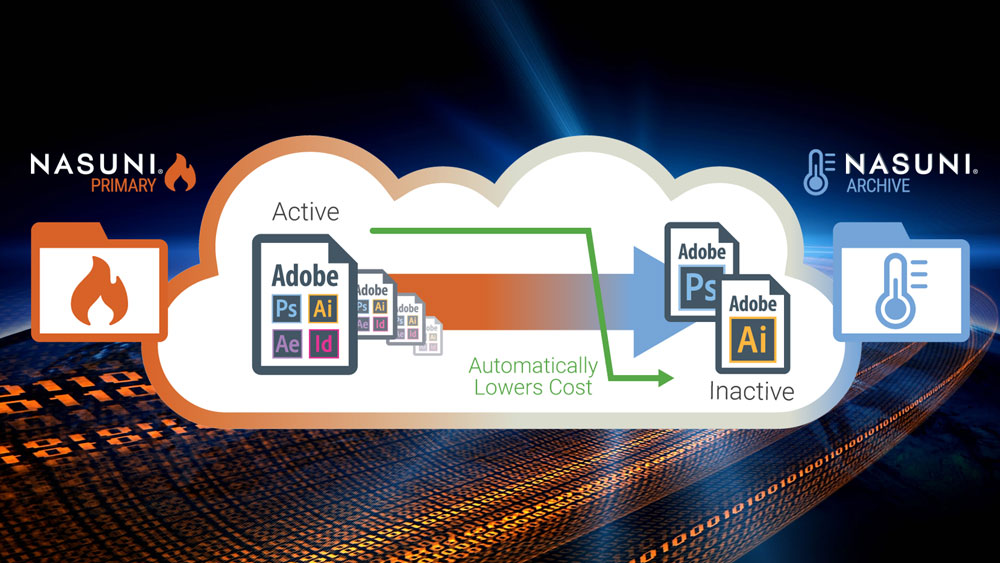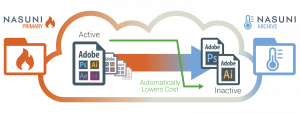Never Migrate Unstructured Data Again with Cloud File Services
September 24, 2018 | Tom Rose
Technology vendors often make outlandish claims. Our announcement today isn’t one of them. The new release of Nasuni Cloud File Services frees IT from ever having to migrate unstructured file data again. Store file data with Nasuni, and we correlate what you pay with how frequently you access it. If you want to pay less, just stop using your data. It’s that simple.
How Did This Data Migration Thing Get Started?
IT has always dealt with increasing data growth and the capacity limitations of their expensive physical storage arrays the only way possible: classify the important data used every day as primary, classify the older data not regularly accessed as secondary, and migrate the secondary data to cheaper tiers for long-term archiving. Then, migrate the primary data to bigger primary storage boxes every 3-5 years as data continues to grow.
That’s why technologies like Hierarchical Storage Management (HSM) were invented. HSM keeps pointers to aging files on primary storage so they are still visible, even though they’ve actually been migrated in the background to cheaper (and slower) storage tiers. You can still access the files – it just takes longer.
HSM adds complexity, so many IT pros are back to manually archiving file data. Either way, the whole principle of data migration has 2 fundamental flaws, especially now that unstructured data in the enterprise is doubling every 2 years:
- It adds inordinate cost and complexity to IT operations.
- It no longer meets enterprise requirements.
Every enterprise is undergoing digital transformation to become more efficient and more competitive. The emergence of AI and analytics – now offered as scalable, cost-effective cloud services – unlocks the hidden value of historical data and completed projects. Data can no longer be classified as primary or secondary. File retention and future access needs are now impossible to predict. All data needs to be available on-demand, from any location.
Disruptive Solution #1 – Cloud Object Storage
Object storage, delivered in public cloud or private cloud flavors, is the “new disk” that overcomes the hardware capacity constraints of traditional file storage. With its low cost, durability, and limitless scalability, IT no longer has to keep buying bigger Dell EMC Isilon or NetApp boxes or file servers every 3-5 years to store primary data. Object storage is also affordable enough to store the secondary file data.
But object storage alone doesn’t solve the unstructured data migration problem:
- Most existing apps don’t write natively to object storage, so they cannot use it.
- Data still needs to be protected, since object storage doesn’t have native backup, snapshot, or versioning capabilities.
- Users and apps need high performance file access in many locations, and will not accept the cloud or WAN latency to access files directly from object storage.
- If you cache files locally for high performance access, you need a way to synchronize changes from multiple locations.
- Multi-site file read/write access requires file locking to prevent version conflict.
- Object storage is a flat address space, so users still need a way to organize and find their files.
- With so many strong private and public cloud object storage choices, IT needs the flexibility to choose the best one for their business.
Disruptive Solution #2 – Cloud File Services
An emerging category of software called cloud file services completes the picture. Nasuni Cloud File Services is the leading solution in this space, and makes cloud object storage the ideal solution for storing unstructured data:
- Supports CIFS/SMB and NFS file sharing protocols for compatibility with existing apps.
- Writes files natively as objects via integration with leading object storage solutions, giving IT the flexibility to pursue a multi-cloud strategy.
- Caches active files on virtual or hardware edge appliances for high performance file access in any location. Appliances can be mapped to volumes in different object stores for fast, multi-cloud file access.
- Addresses the need for cloud backup and surpasses the RPOs and RTOs of traditional file backup with Nasuni Continuous File Versioning™ technology.
- Synchronizes and sequences file changes from all locations with patented Nasuni Global Volume Management™ technology.
- Ensures only one person in any location can modify files at a time to minimize version conflict with patented Nasuni Global File Lock™ technology.
- Organizes files in a familiar folder structure so they are easy to find.
The Breakthrough: No More Data Migrations
The new release of Nasuni Cloud File Services consolidates NAS and archive data in one limitless solution. Finally, enterprises can cost-effectively store any amount of file data for any length of time, align costs with access requirements, and give users and applications fast access whenever, and wherever, it’s needed … without any more data migrations.

Here’s how our unique, software-defined approach makes this breakthrough possible:
- The foundation of the Nasuni platform is UniFS®, our patented global file system that is the first to reside in object storage. Freed from the constraints of legacy device or cluster-based file systems, UniFS has no capacity limits.
- High performance file access is provided through Nasuni Edge Appliances – stateless virtual machines or hardware appliances that can be located on-premises or in the cloud. Sized to cache just the active files and their associated metadata (typically 80% the size of a legacy NAS box), enterprises can now leverage cooler tiers of object storage (e.g. Amazon S3 Standard-Infrequent Access, Azure Cool LRS, etc.) for all their files. With the requested files coming from cache nearly 99% of the time, there’s simply no need to pay for high performance cloud storage.
- With object storage as the sole repository for all file data, the need to migrate unstructured data to cheaper tiers or upgrade hardware to bigger boxes is eliminated.
- With all unstructured data in one global file system, analytics and AI services from any cloud can be leveraged. Edge appliances can even be instantiated in one cloud to analyze data stored in another.
What Customers and Partners Are Saying
Watch the Webinar
When is the last time you undertook a forklift upgrade or data migration? How long did it take? Comment below to let us know how it went.
If you want to leave this IT headache behind, watch the webinar, “Never Move Data Again: Combine NAS & Archive in One Cloud Solution” on September 27, 2018 – Register Here.
Andres Rodriguez shares why enterprises need to get fit for AI and the top factors prohibiting their AI success.
Jim Liddle shares how Nasuni is educating customers on how to create customized Microsoft Copilot experiences with AI business tools that use a customer’s unstructured data set to unlock further business insights and revenue streams.
Lance Shaw shares insights from Gartner’s ‘Market Guide for Hybrid Cloud Storage’ as well as their projections for the market over the next few years.





